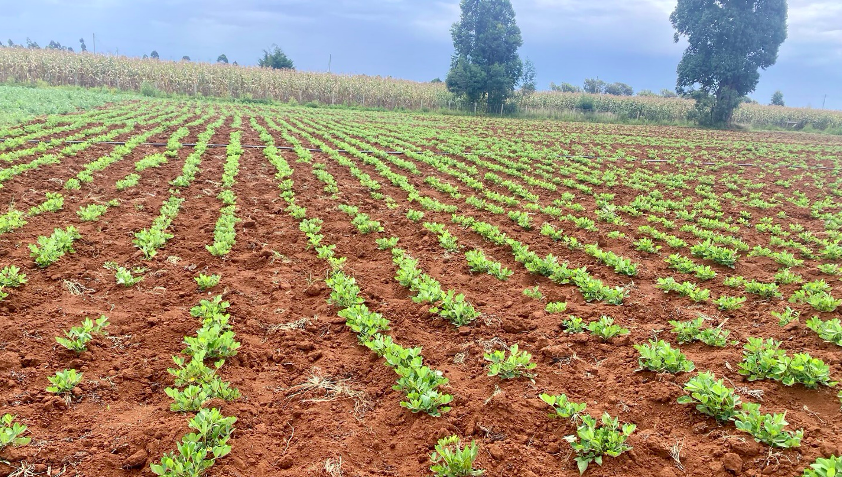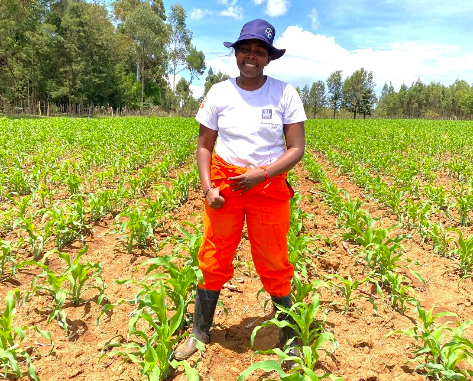 Jannette's farm. She ensures each plant is receiving the care it deserves.
Jannette's farm. She ensures each plant is receiving the care it deserves.
Jannette Toroitich is better known in social media circles as Jannette Farm Girl, a farm influencer, agripreneur, and an unstoppable advocate of climate-smart agriculture. Her own story is the evolving one of Kenyan agriculture, where youth, technology, and smart practice are revolutionising fields and futures.
Jannette, 30, began farming in 2020, coming home to manage her family's big wheat and maize farm in Uasin Gishu after pursuing a degree in Cooperative Business (Finance) at the Cooperative University of Kenya. Her day is a combination of boots-on-the-ground action and live digital interaction. Mornings are spent inspecting crops, tracking the stages of growth, and writing notes for her growing online audience. Mid-mornings can also see her calling in at stockists to talk through the merits of soil-specific fertilisers, and afternoons will typically find her participating in live agronomy webinars hosted by Yara Knowledge Centre (YKC), blending old-fashioned farming with science new-fangled.
"Our generation learns fast, conforms fast, and is already plugged in digitally," Jannette says. "We are not intimidated by apps and analytics. We hunger for data, we hunger for results, and we hunger for meaning."
Using tools like the Yara Farm Care App, she maps her
fields, monitors weather forecasts, locates trusted agro-dealers, and receives
fertilisation recommendations specific to crops. These are not theoretical
technologies – she relies on them on a daily basis to handle rain-caused
planting delays, reschedule, and minimise input loss. This real-time,
data-driven approach has enabled her to reduce fertiliser application by up to
15 per cent while raising yields up to 50 per cent in targeted fields of her
farm. This real-time data-driven system has allowed her to lower the
application of fertiliser by up to 15 per cent while increasing yields by up to
50 per cent on specific sections of her farm.
"Applying more fertiliser is not the problem," she maintains. "It's being applied correctly. At the right time, in the right amounts, on the right crop. That makes all the difference."
Jannette is particularly insistent on debunking myths deterring younger farmers from applying fertilisers. Most, she asserts, are wrongly assuming that fertiliers damage soil or are too costly. She debunks these myths based on facts and references studies done by institutions like the African Plant Nutrition Institute (APNI) and Kenya Agricultural and Livestock Research Organization (Kalro). The research confirms that fertiliser abuse and not fertiliser itself, is the real soil health hazard. Overuse, wrong timing, or indiscriminate use results in soil nutrient mining, acidification, and runoff.
 Jannette Toroitich taking a moment to assess the crops at her farm.
Jannette Toroitich taking a moment to assess the crops at her farm.
"More so young farmers should realise that crops need different nutrients at different times," she states. "And since many of us farm in small patches, we have to work smarter, not harder."
She extends her work beyond the farm. Jannette is constantly
in touch with stockists and agro-dealers to improve their awareness on
soil-specific fertilizer suggestions. She also mentors’ young farmers online,
giving them tips on crop nutrition, soil analysis, and agri-business
management. She collaborates with the Yara Leadership Academy for youth
involvement in agriculture—teaching them book-keeping, business planning, and
marketing; skills less commonly provided in traditional farm settings.
One of the representatives of Yara Knowledge Centre describes her as "a force for change among the youth, bridging science, community, and innovation in the most accessible form."
Jannette believes that farming can be a gold mine for
youth, not just in terms of dollars but in mission. She envisions more
youth-focused incubators, web-based farming cooperatives, and support groups
where young farmers are able to test and scale their businesses. She sees
agribusiness as the key to economic empowerment, environmental rejuvenation,
and national food security.
She is pragmatic, though, about the challenges. Kenya's changing climate, with rising temperatures and declining rainfall, is putting a threat to smallholder production. Food and Agriculture Organization of the United Nations (FAO) estimates that up to 40% of fertilizer used is lost through leaching, runoff, or volatilization since it is being applied in an inefficient manner. That is a huge loss of funds and an environmental threat. The professionals' message is plain: unless we use fertiliser with the 4Rs—Right source, Right rate, Right time, and Right place—we risk not only wasting inputs but damaging the very soils we depend on.
"Fertiliser's not the culprit," asserts Jannette. "Ignorance is. And that's why I teach. I share. I show what works. Because this information isn't mine to keep, it’s ours to share."
Looking ahead, Jannette sees others like her doing even more; such as developing seed varieties or adding services to allow growers to produce more than one crop in a year. She pictures herself not just as a farmer, but as a keeper of knowledge, turning soil for her own children and the children that follow.
"The world is changing, and we are changing too," she goes on. "We're not just food producers. We're mud-booted innovators. If you care about the earth or the science, you have a role to play. This is our gold rush."











